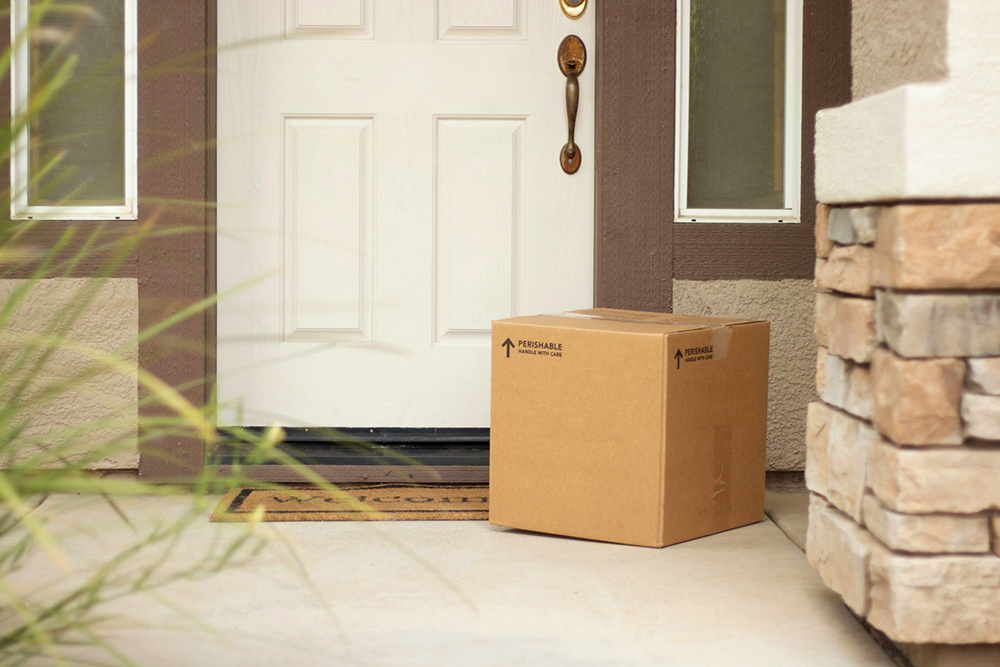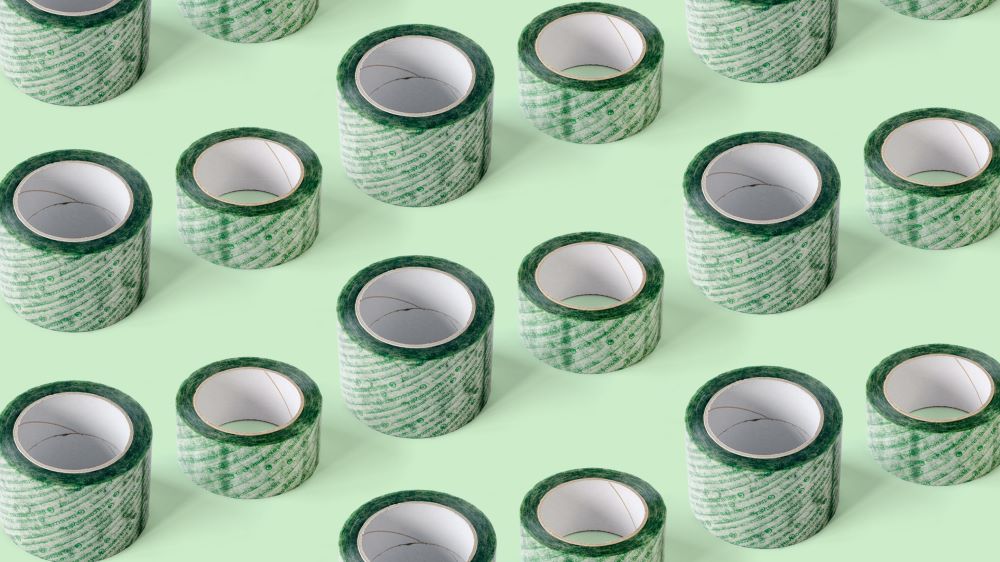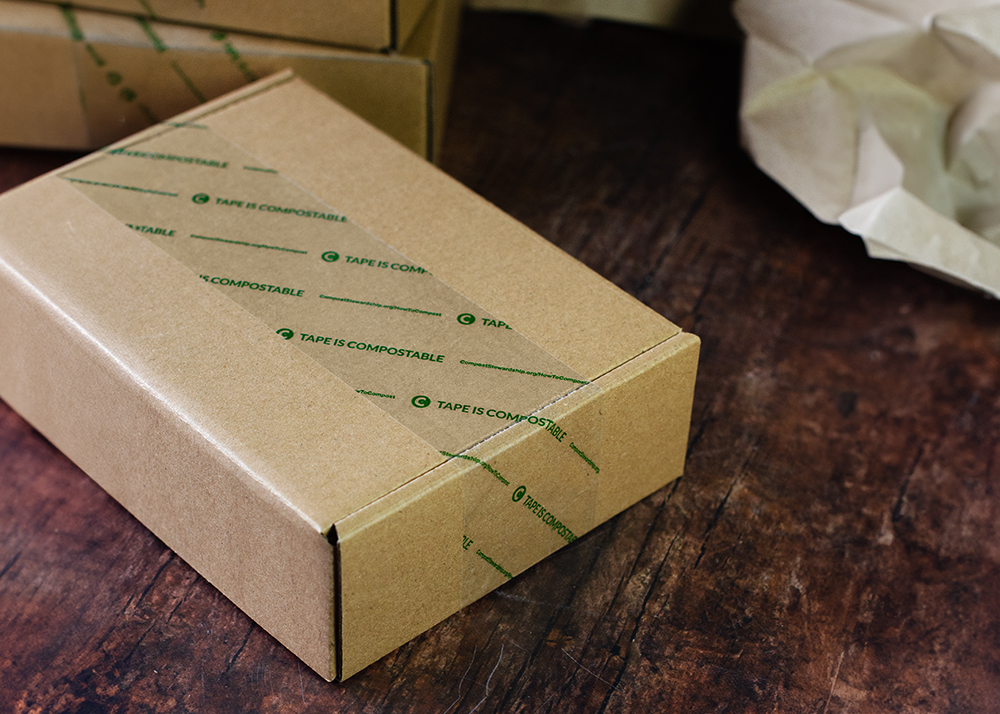With the average American household receiving a staggering 162 packages in 2022 and global shipments reaching a monumental 356 billion in 2023, the impact of our packaging choices cannot be overstated.
Packing tape, often hidden in plain sight, is an integral part of shipping goods to retailers, vendors, and customers. Most packages will have tape, and a significant portion of that tape is plastic. Inconspicuous sources of plastic waste can accumulate significantly over time, contributing to environmental harm if not properly managed.
"What most people see in their garbage cans is just the tip of the material iceberg; the product itself contains on average only 5% of the raw materials involved in the process of making and delivering it"
- Michael Braungart, Cradle to Cradle: Remaking the Way We Make Things

Understanding Different Types of Packing Tape
Tape is a fundamental item in everyday life and business. First invented in 1845 as surgical tape, its application expanded to business use with the introduction of masking tape in 1925 and cellulose tape in 1930. Today there are various types of packing tape that cater to a wide variety of needs in packaging and shipping.
Tape Materials
Each material offers unique properties that cater to different packaging needs and environmental considerations. From eco-friendly options like compostable tape to traditional choices like plastic tape, the material of the tape plays a significant role in its performance and impact on the planet.
- Paper-Based Tape: While paper-based tape provides an eco-friendly alternative to traditional plastic tapes, it may vary in its biodegradability and recyclability. Its suitability for sealing lightweight packages and cartons makes it a good sustainable option for some businesses.
- Plastic Tape: Clear packing tape, typically made of polypropylene or PVC, is a common choice due to its affordability, ease of application, and water-resistant properties. However, its non-compostable nature raises environmental concerns, making it less favorable for businesses seeking sustainable packaging solutions.
- Compostable Tape: Compostable packing tape stands out as a sustainable alternative to traditional plastic tapes. With strength and performance similar to plastic tape, it provides businesses with an eco-friendly option to reduce their environmental footprint without compromising on performance.
Adhesive Types
The type of adhesive is another important factor to consider when selecting packing tape. The adhesive determines how well the tape adheres to surfaces, its ease of use, and its overall reliability during shipping and handling.
- Water-Activated Tape: Activated using water, this type of tape offers superior adhesion and security. Available in non-reinforced and reinforced forms, it is suitable for a wide range of packaging needs.
- Pressure-Sensitive Tape: Convenient and easy to use, pressure-sensitive tape adheres upon contact with the packaging surface. This type of tape is convenient and easy to use, requiring no additional activation steps.
By understanding the characteristics and applications of each type of packing tape, businesses can make informed decisions to meet their packaging needs while prioritizing sustainability.
Choosing the Right Tape for Your Business
When selecting packing tape for your business, it's crucial to consider factors like durability, performance, and environmental impact to make the most sustainable choice.
Durability: Assess the durability of different tape options based on the weight and nature of your packages. While reinforced water-activated tape offers exceptional strength, it may not be suitable for all packaging needs due to its embedded fiberglass strands. On the other hand, pressure-sensitive tapes provide versatility for various packaging needs without compromising on strength.
Performance: Evaluate the performance characteristics of each tape type, including adhesion strength, resistance to temperature changes, and ease of application. Pressure-sensitive tapes offer reliable performance across a wide range of conditions, ensuring secure packaging without the need for water activation.
Environmental Impact: Prioritize eco-friendly alternatives to minimize your business's carbon footprint. Compostable pressure-sensitive tape provides a sustainable alternative to traditional plastic tapes. Its compostable nature ensures minimal environmental impact, making it a top choice for businesses committed to sustainability.
Cost Considerations: Cost is an important factor to consider alongside sustainability. While eco-friendly options may initially seem more expensive than traditional plastic tapes, it's essential to look at the long-term cost savings and benefits they offer. Investing in sustainable tape can lead to reduced waste and improved brand reputation. Consider the total cost of ownership, including durability and performance, to make a cost-effective decision that aligns with your sustainability goals.
Looking For Compostable Tape?
Tape is just one component of a larger packaging ecosystem. Beyond tape, various elements contribute to our overall environmental footprint, including other “hidden” sources of plastic waste in our business operations. Packaging, in its entirety, plays a significant role in your brand's environmental footprint.
When considering the transition to sustainable tape (and other packaging) it becomes crucial to partner with suppliers who not only meet functional requirements but who also share a dedication to making a positive impact on the world.
This alignment between mission and packaging choices is a powerful way to communicate a brand's purpose and values to customers. As you navigate the complexities of sustainable packaging, seeking out partners who understand and support your mission can make all the difference in achieving your environmental and brand objectives.
Your seemingly small choice of packaging tape could be more than a logistical decision—it's a statement of your brand's commitment to environmental stewardship. By choosing eco-friendly compostable tape and taking into account the broader packaging ecosystem, sustainable businesses have the opportunity to lead by example. This conscious decision not only benefits our planet but also strengthens customer trust and loyalty, as consumers increasingly prefer to support brands that prioritize sustainability.
In exploring the broader implications of our packaging choices, we are not just making a change; we are inspiring one.
Looking For Compostable Tape?


